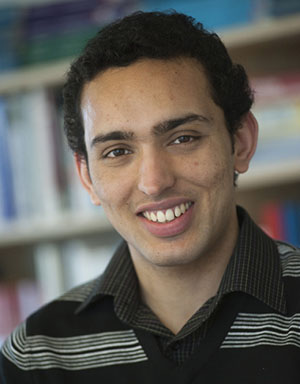PhD Tallat Mahmood Shafaat
CONGRATULATIONS ON YOUR GRADUATION
Already during his undergraduate studies in Pakistan Tallat Mahmood Shafaat got a special interest for distributed systems. He went to Sweden and KTH for the master programme in Software Engineering of Distributed Systems. His interest grew and he decided that he wanted to continue with research within distributed algorithms and systems. Now he has defended his thesis "Partition Tolerance and Data Consistency in Structured Overlay Networks".

Where are you from and where did you study before coming to KTH and School of Information- and Communication Technology?
– I am from the scenic northern areas of Pakistan. I did my undergraduate studies at GIK Institute of Engineering Sciences and Technology, Pakistan. I came to Sweden to study a master's programme at KTH, specializing in distributed systems.
What is your topic and why did you choose it?
– My field of research is distributed algorithms and systems. During my undergraduate studies, I took a course in distributed systems, which ignited my interest in the subject. This led me to do my final year project of undergraduate, and my master studies, in distributed systems. Through time, my interest grew as I found the problems very challenging, non-trivial, and practical. There are many distributed systems in use; in fact, it is hard to find a service that is not distributed. I made a firm decision during my master studies that I will continue with research in this area.
Describe your topic in short.
– As systems grow in size, they require more processing power and storage capacity. These requirements cannot be satisfied by a single computer, and hence, need to be "distributed" over a number of machines. As the number of machines used increases, the chances of machines (and any connecting network) failing increases. An important aspect of such large-scale systems is to seamlessly handle, both network and machine, failures. Another vital aspect is not to depend on a single (or a small number) machine for serving most of the requests. Doing so would easily reduce the system performance, and be less fault-tolerant. Thus, it is vital to decentralize tasks as much as possible. In my work, I focused on designing algorithms for handling failures, especially the effects of network partitions and mergers on the software layer, and guaranteeing data consistency in a large-scale distributed setting. My focus was on systems that are completely decentralized (peer-to-peer) and self-managing. I started out with proposing algorithms to tackle various challenges faced in a such distributed systems. Based on the results, we build a distributed storage system that is partition-tolerant, provides data consistency, and is scalable and self-managing.
Tell us something about your results.
– Based on research results of the thesis work, we implemented a distributed storage system, that is decentralized, self-managing, partition-tolerant and guarantees data consistency. In cloud environments, such a system can be vital. Current systems similar to our work, such as Cassandra and Dynamo, do not provide strong data consistency. Thus, the user of these systems has to be aware of any inconsistencies, and should implement logic to handle any data discrepancies. Our solution alleviates the user from worrying about data inconsistencies, and is ideal for applications that require strong consistency.
What will the future bring for your research topic?
– As systems grow in size, the importance of the field of distributed systems dawns upon us. Modern web-scale applications generate and access massive amounts of data at very high rates. The wide-spread adoption of distributed systems brings in new challenges and problems. We are already witnessing fundamental research in cloud computing, and its industrial application. This trend will only increase. Future research will make adaption and implementation of distributed systems easier, and make Multi-data center, and Geo-distributed, systems more common.
What are your plans for the future?
– While I thoroughly enjoyed my time in academia and research, I want to experience life in industry. Hence, I will be joining a company that focuses on building large-scale distributed systems. Once I get a feel of industry, I will be able to make a more informed decision whether to continue in industry, or return to academia.

